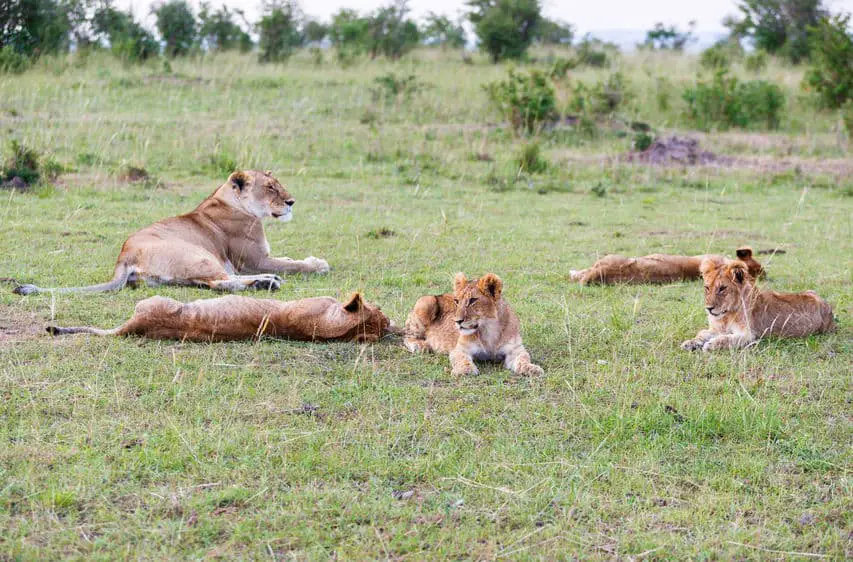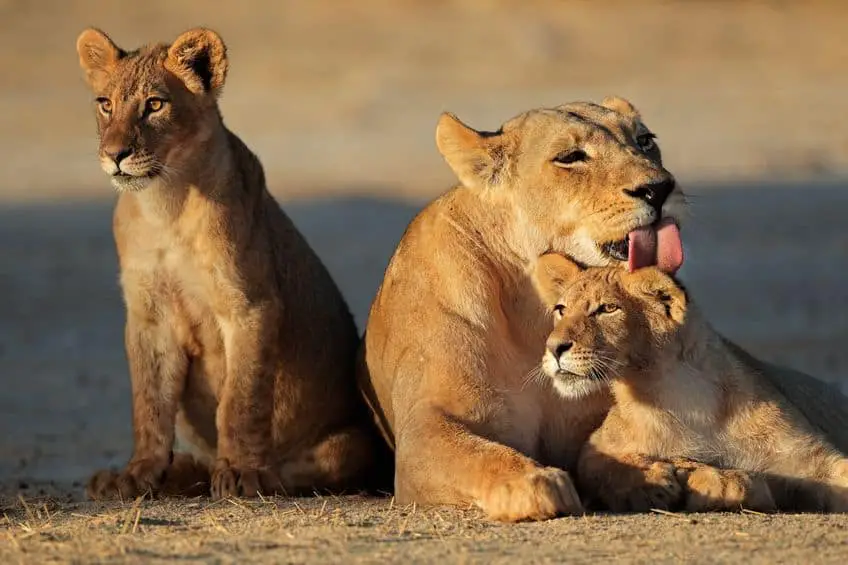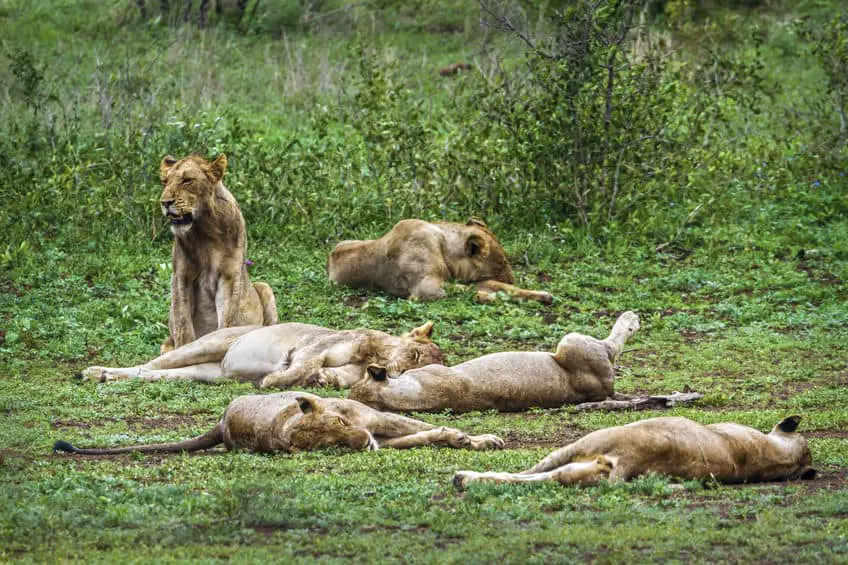
African lions are fascinating creatures for many reasons and one thing that is especially fascinating about them is how much they sleep. While lions are known to be notorious predators, hunting and eating are far from what they do most. In fact, the majority of lions’ time is spent sleeping or resting.
How much do lions sleep? African male lions sleep around 18-20 hours per day on average. Female lions sleep around 15-18 hours per day. The reason why female lions sleep less than male lions is that they usually spend more time hunting or taking care of cubs.
You could get the impression that lions are just lazy and while lions sure do enjoy relaxing, there are some very good reasons why they sleep as much as they do.
Why Do Lions Sleep So Much?
Lions definitely enjoy relaxing and being lazy but this is far from the only reason why they spend such a large amount of their time resting or sleeping. In fact, it has little to do with laziness and a lot to do with energy preservation and efficiency.
Let’s take a look.
One of the major reasons why lions spend so much of their time resting or sleeping is to preserve energy during the day.
Lions are nocturnal (or crepuscular) animals and are active primarily in the twilight period which is the time period between dawn and sunrise or between sunset and dusk. They do most of their hunting in the very early hours or the very late hours of the day. Resting or sleeping during the warm hours of the day allows the lions to preserve energy which makes them more efficient when they hunt during the darker, cooler hours of the day.
Much of the lions’ prey such as antelopes, zebras, and giraffes are active during the day and more inactive in the early morning or late evening. Some antelopes can actually store energy in their bodies during the day which is released in the evening which means they have less endurance and are not as fast in the evening as they are during the day.
Since lions do the opposite and spend most of their day resting or sleeping while preserving energy and do their hunting in the early morning or evening, they gain an advantage over their prey since they are usually easier to sneak up on and catch at this time of the day.
In addition to this, lions are actually slower than much of their prey. Lions can run around 50 mph (80 km/h) and some gazelles can run as fast as 60 mph (100 km/h). This also makes hunting in the morning or evening easier for the lions as the prey is less active and easier to catch at this time.
Lions’ eyesight is actually also much better in low-light conditions than that of their prey which also gives lions an advantage when hunting at night.
Why not rest and relax during the warm, sunny day when you are more efficient in the evening anyway?
So as you can see, there are numerous reasons why lions spend so much time resting or sleeping during the day and how it actually benefits them greatly when it comes to hunting at night.
All of this being said, don’t think that you cannot spot lions during the day. This is definitely still possible so let’s dive a bit into that.

How to Spot Lions During the Day
African lions can often be seen sleeping under trees and bushes during the day.
Lions like to take advantage of the nice cool spots provided by the shadow cast by trees and bushes since the African heat can be overwhelming on a warm, sunny day.
Instead of being out in the warm sun, lions preserve their energy for the darker, cooler hours in the evening and night which is why lions are more often seen sleeping or resting than hunting or eating.
Lions also like to rest or sleep near waterholes as these can provide easy access to drinking water which can be a necessity during warm and sunny days.
So if you’re out on a safari during the day and want to increase your chances of spotting the magnificent lion, keep an eye on shadowy spots under trees and bushes, especially near waterholes.
This being said, however, you can definitely still be lucky and see a pride of lions hunting prey such as gazelles, zebras, giraffes, or even buffalos during the day if the conditions are right.
Lions are known to be more active on cooler, cloudier days than on warm, sunny days as the heat is not nearly as overwhelming which actually allows the lions to hunt more efficiently without overheating.
So if you wake up to some boring grey and cloudy weather, fear not! Take advantage of this and get out and see if you can spot some lions or other big African cats that are otherwise mostly nocturnal animals and therefore harder to spot during the day.
As I have discussed, however, lions are nocturnal animals and are mostly active at night so if you truly want to increase your chances of spotting some lions, perhaps even when they are hunting or eating, make sure to go on a game drive in the very early morning or the late evening, preferably around sunrise or sunset, as lions tend to still be active at these hours.

Lions are Among the Top Sleepers of Africa
Now that we have learned a bit about how much (and when and where) lions sleep, it could be interesting to compare this to some other African wildlife.
Do they all sleep as much as lions? Not at all! In fact, lions are among the top sleepers in the world and most other African animals sleep much much less.
Giraffes (to pick a not-so-random example) only sleep for about 30 minutes on average during a 24-hour period. The primary reason for this is that sleeping for much longer would make them too vulnerable to lions and other predators. Sometimes they actually sleep standing up as it takes them quite some time to stand up after laying down.
Like giraffes, zebras can often be seen sleeping while standing. And like giraffes and other herbivores, this allows them to be less vulnerable to lions and other predators. To get proper sleep, zebras do, however, need to lie down. Zebras sleep up to seven hours a day.
Elephants sleep around 2 hours a day and these 2 hours are rarely uninterrupted. Just like most other African mammals, elephants have to be alert and ready in case a predator comes too close.
These numbers are averages and some of the African giants can actually go for weeks without any sleep.
Even cheetahs, perhaps a bit more comparable to lions than giraffes, zebras and elephants are (yet very different, but let’s save that for another post), sleep much less. Cheetahs sleep for around 12-14 hours per day.
Another big African cat who is also a member of the legendary Big Five, the leopard, has similar sleeping habits as lions and often spend much of the day resting or sleeping. Leopards are also nocturnal and are usually active and hunt at night. Leopards are known to sleep in trees and there are several reasons for this. One reason is to stay safe from other animals such as lions, hyenas, or wild dogs and another reason is that leopards are incredibly strong and able to carry their prey up into the trees where they can keep them from other predators.
So as you can see, sleeping patterns have evolved in extremely different ways for African wildlife based on what they need for better survivability. That’s evolution at its finest. Thank you, Darwin!
These examples represent some of the most well-known African wildlife and as you can see, lions spend a significantly larger amount of their time sleeping. Why? Because they can! And because they get several benefits and advantages from doing so.
